Cheeky, rude, stylized, stylish, in crashingly bad taste and with something to offend absolutely everyone. In short, check it out. This week saw the release of two supposedly transgressive, shocking, subversive movies — Fifty Shades of Grey and this. The big difference is that the former is a tease, a snare, a lie, while Kingsman: The Secret Service delivers on those promises. Oh, you may not like it, but you’ll be hard-pressed to say its transgressions are mere hype. Look, I’m pretty jaded. I’ve almost seen it all — and enough times that I yawn at most of it and shrug off the rest. Though I can’t say I was ever actually offended by the film, I was startled — even shocked — by a few points, and I most certainly never yawned. The movie’s too much unwholesome fun for that — and it’s definitely too prickly.
Kingsman is, in fact, sufficiently prickly that it has succeeded in appalling critic friends of mine with whom I usually (more or less) agree. It has also prompted a certain amount of back-and-forth emailing with folks I saw it with — the point being whether or not to be offended, what to be offended by and what the underlying meaning of it all is. While I admit that the film’s tone is frequently reactionary and decidedly of the opinion that good manners, Saville Row tailoring and a very cinematic vision of upper-class England are the only hope for humanity, I think it’s not terribly concerned with underlying meaning. This is first and foremost a 1960s spy/Bond spoof in sort of modern terms. It’s a lot like the 1967 Casino Royale — with a lot more blood and carnage. In fact, the two films have more than a few similarities, including — but not limited to — the criticisms leveled against them.
The plot is reasonably straightforward — at least as these things go. Kingsman is an organization of spies — hidden behind and underneath (and with pneumatic transport to a Stately Homes of England training facility) a high-end clothing concern. This is no ordinary spy organization. These are the elite of the elite — really top-drawer representatives of what the movies have taught us is Great Britain at its best and most sophisticated. They do not represent Her Majesty’s government. They are too sophisticated to require any such sanction as they set the world to rights with their special skills, bottomless wallets and James Bond gadgetry. In the midst of finding a replacement for a fallen comrade, they find themselves pitted against a megalomaniac (Samuel L. Jackson putting his own spin on Jack Nicholson’s performance as the Joker) with a fiendishly extreme plan for solving the climate change problem. He plans to kill off most of humanity — leaving only a select group of one-percenters and their requisite servants — to bring things down to a manageable level.
To say much more about this aspect of the film would probably do it a disservice. Let’s just say that it’s a less specific, technological riff on Dr. Noah’s bacillus from the original Casino Royale. The problem with saying more about this is that it might blunt the impact — comedic and shocking — of such outrages as a magnificently violent test run at a thinly-veiled version of the Westboro Baptist Church and an almost Cronenbergian sequence joyously (and blasphemously) set to Elgar’s “Land of Hope and Glory.” While I suspect familiarity won’t really damage the impact of this, some things are just better experienced than described. It is a film made by people who obviously know and love their 1960s spy movies but aren’t afraid to take their tropes to new and disturbing levels.
While the film showcases agent Harry Hart (Colin Firth), it’s ultimately more focused on his — wildly inappropriate — candidate for the replacement Kingsman, Gary “Eggsy” Unwin (a star-making turn by newcomer Taron Egerton), a street tough who happens to be the son of a Kingsman who died saving Harry. The goal is to transform Eggsy into something like Harry’s own impossibly poised self. (Think Patrick Macnee as John Steed in TV’s The Avengers — the perfect embodiment of a potentially lethal English gentleman, but here one who doesn’t need the assistance of Diana Rigg’s Emma Peel when it comes to doing battle.) It is exactly as Eggsy views it — “like My Fair Lady.”
Should you see it? Well, if you’re particularly squeamish or have an aversion to violence, probably not. Otherwise, yes. Will you be offended? Oh, very likely — and not necessarily for reasons you might expect — but that’s rather the point. There’s something to be said for a movie — especially a comedy — with that kind of power. Rated R for sequences of strong violence, language and some sexual content.


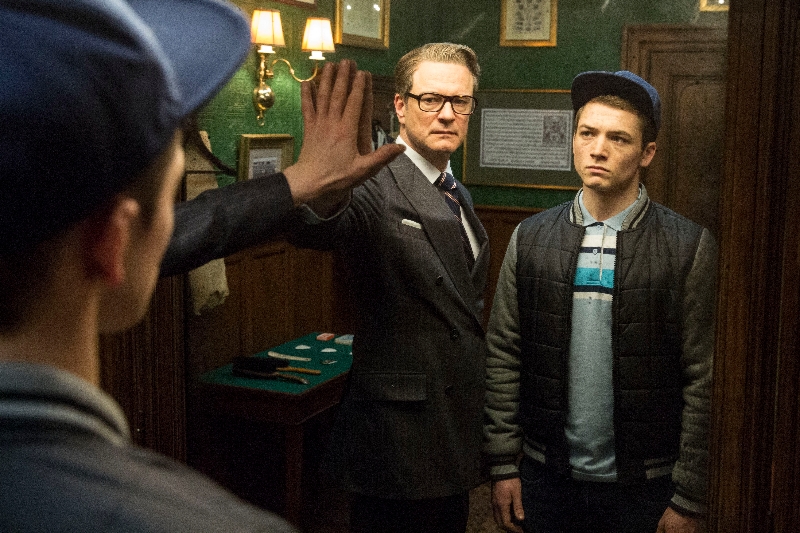
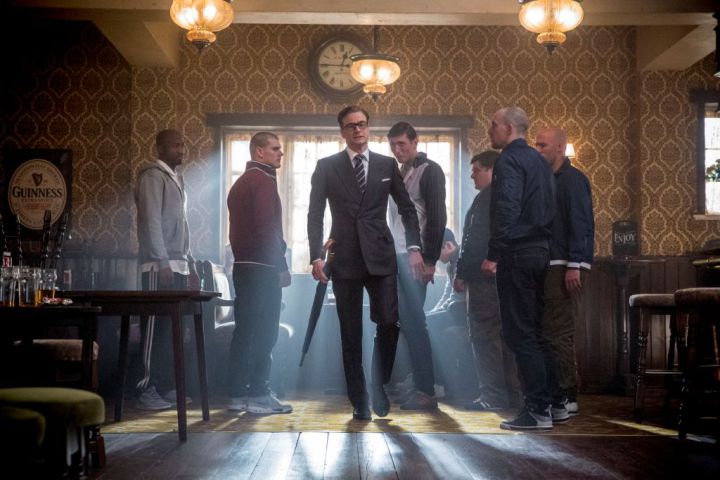
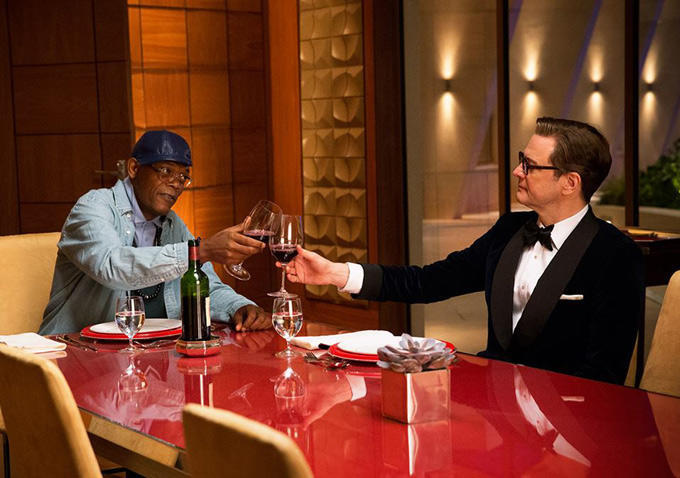
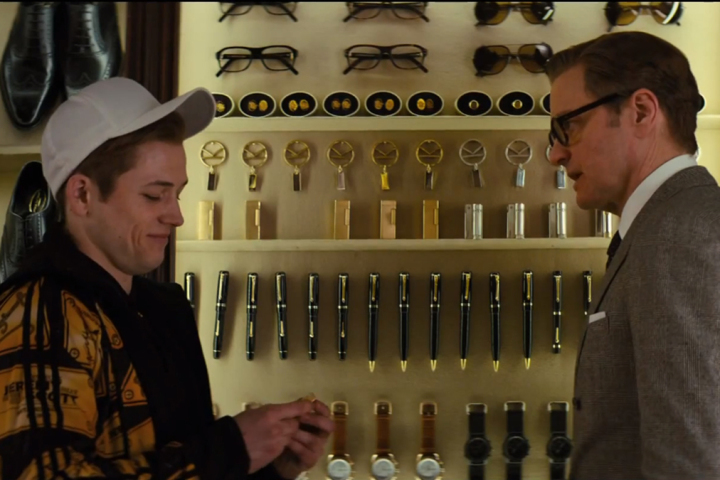
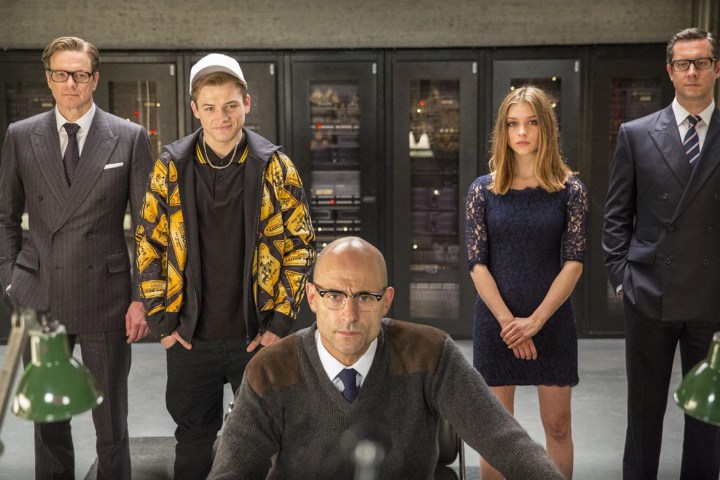
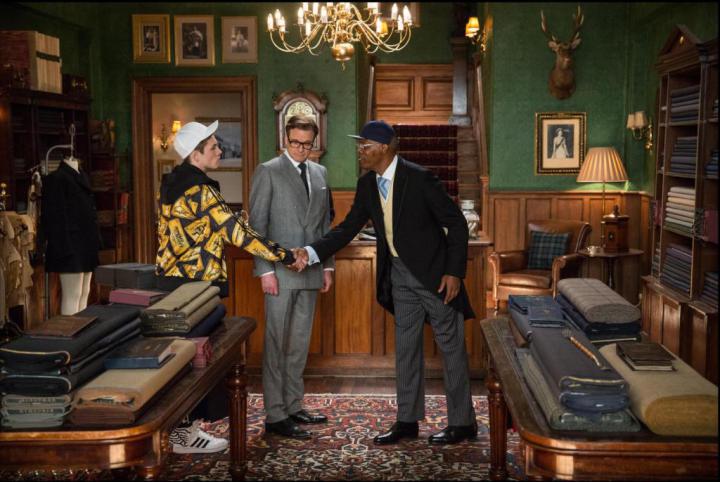
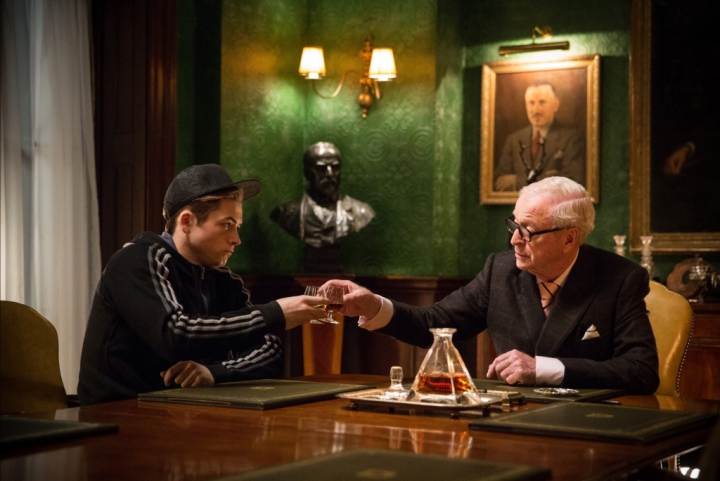

It’s a lot like the 1967 Casino Royale — with a lot more blood and carnage.
Firth is kind of the modern day David Niven, now that I come to think about it.
The story (forget the excesses) is parallel to “the President’s Analyst”. Ken, how could you have missed this?
The same TPC, updated to the modern era.
To tell more would be to give the plot away.
Best
Danny
I probably missed the similarity because I haven’t seen The President’s Analyst in 30+ years. The 1967 Casino Royale, on the other hand, I see at least once a year.
Have no fear, Bond is year. . . ly
He’s going to save the world at Casino Royale.
Ba da da do do da dee dee ba do do da da da duh da dah dudda dummmm
Jaaaaaaaaames Bond
We’re fighting for our lives — with guns and knives!
Can’t wait! Looks very fun.
This was very nice indeed. And by nice I mean utterly depraved, breathlessly exciting, and exceptionally entertaining, even if admitting that last point seems like it should make me feel more guilty than it actually does. But I really feel like that’s kind of the point (or at least the one that comes a good bit after simply being a real humdinger of an entertainment). That the targets of the movie’s most outrageous instances of calamity (the two you mentioned) don’t realistically merit much sympathy, and that those instances are the ones that make me feel the most uncomfortable for pretty much reveling in them, is an example of some extremely shrewd, extremely pointed decision making. When I can watch any given action movie and feel nothing resembling guilt or discomfort when hundreds of faceless goons are cracked into nothingness in a manner even more explicit than what’s on display here, and then watch this and feel noticeably squeamish when an assortment of detestable foulness is disposed of in an exceptionally stylish way, then the latter has to be doing something interesting, meaningful, and intentional. That it can do so without losing even a sliver of its massive entertainment value, or even any of its intrinsically likable nature, is exceptionally satisfying and as shocking as anything in the film itself.
And would you think that it’d be off-base to say there’s something vaguely Russellian about it? It may just be that the Elgar-set sequence here reminds me of the fantasy sequence from near the end of THE MUSIC LOVERS (the novel removal of heads set to classical music isn’t something I see everyday, after all), but there’s a lovable sense of not caring which horses are being frightened buoyed by an intrinsically good-natured core here that reminds me of some of Russell’s 60’s/70’s work (though that may be something more simply attached to that particular era; I think he’s now the director I most readily attach to that sensibility, so maybe that’s why I feel like there’s a similarity).
I’m kind of ashamed The Music Lovers connection didn’t occur to me. Maybe it’s because I’m so used to the scene in The Music Lovers — I’ve known it for 40 years — that it no longer shocks me. Then again, it’s also a lot nastier and more personal than the cartoonish mayhem in Kingsman. Still, the comparison is a solid one. It’d be hard for me to tell if it’s T’other Ken or the era, though I think of Dick Lester as the voice of film from 1964-69 and KR as 1969-75. Maybe ’77 depending on how I’m feeling about Valentino at the moment.
Absolutely loved it. This will be in my top ten this year for sure. Near the end, when they quoted the final lines from Trading Places, I was in heaven. It was like the movie was made just for me. This is going to be a fun Spy year. This, Man from UNCLE , and the big man himself in SPECTRE. Bring it on.
Near the end, when they quoted the final lines from Trading Places, I was in heaven.
Dear God.
I’m impressed with Hanke’s allusions and scholarship on this movie, but movie history and allusions don’t interest me. What does is the same stuff that makes a good novel, specially the issue the Greeks termed dianoia, the thought that pervades and informs the plot. Here Samuel L’s motivation seems to be with “culling” the human race before it’s too late (that’s the surface idea, anyway.) Now, in a purely objective, amoral sense, this isn’t a bad idea. The world is surely already overly filled with the human swarm (visit any big city in any country). I have read that we are heading for nine billion and are already past seven.. And already, many streets are chaos. Back to the movie. I urge readers who care about this flick to read Rex Read’s review of it. And when you do, keep Gibbon’s “Fall of the Roman Empire” in mind. One of this writer’s salient arguments is that the love of extreme and graphic violence as “entertainment”(think: “Gladiator”, not the director but the audience in the movie, the aficionados of gore) is one of the causes of that empire’s decline into decadence and thus its fall. This is a decadent movie, an orgy of mindless violence, and I am shocked that a man such as Colin Firth had anything to do with it.
Yes, well…
This movie is a spoof on spy movies and it holds nothing sacred, which might be the point. I do not seek out violence in movies. Ever. But this movie was such a delicious comment on so many aspects of our out of balance Anglo Saxon value system, that I found it strangely refreshing. I am not trying to talk you into liking the film, rather another point of view. I believe we are currently living in an “orgy of mindless violence” which is reflected here. And I love the absurdist view of how to solve ” climate change” which is obviously a dig at the deniers.
Independent journalist Jonathan Cook has an interesting take on this film, a product of Rupert Murdoch-owned Fox. He says in part:
“The film’s two messages – that the elites are there for the reason that they are best-placed to manage the world, and that environmentalists are the real threat to our safety – are so crudely laid out that it is hard to miss them. And yet reading the reviews, miss them is precisely what the reviewers and, it seems, most audiences are doing.”
See his complete comments here:
http://www.jonathan-cook.net/blog/2015-06-05/how-a-hollywood-spy-film-brainwashes-us/
In the first place, I addressed some of those points, though I seriously question the statement that it presents environmentalists as “the real threat to our safety.” In the second, it is not a “Hollywood spy film.” Its pedigree is extremely — even aggressively — British. But my biggest quibble is that the film really has an agenda beyond shocking the viewer with its outrageousness — and that it had the slightest impact as right-wing propaganda.